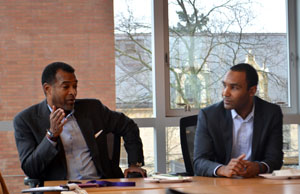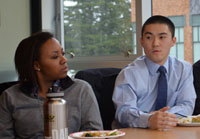Real-world strategies for success
 In March, more than twenty Business & Economic Development Center (BEDC) undergraduate students temporarily pushed aside their group projects and studying for exams to think about career approaches following graduation while attending a BEDC-organized luncheon with Machine Perception Technology CEO, Ken Denman (MBA 1986), and Jawbone Chief of Staff, Andrew Lindsay.
In March, more than twenty Business & Economic Development Center (BEDC) undergraduate students temporarily pushed aside their group projects and studying for exams to think about career approaches following graduation while attending a BEDC-organized luncheon with Machine Perception Technology CEO, Ken Denman (MBA 1986), and Jawbone Chief of Staff, Andrew Lindsay.
Designed as an informal, personal setting for students to actively engage in discussions about career and entrepreneurship options, students questioned Denman and Lindsay and put forth their own questions for navigating the business world. Students who attended came seeking real-world advice. For instance, Diana Nguyen, a student of the Multicultural Marketing class and an executive member of the BEDC’s Leadership Team, arrived at the luncheon seeking to learn how Denman and Lindsay “knew that they were making the right choices” along their career paths, and “what advice…they have for [students] as [they] try to achieve [their] own goals today.”
Both Denman and Lindsay stressed the importance of accessing one’s own individual goals. “Think about how you want to live and what you want out of life,” said Denman. Passion for your work is critical, and one must be invigorated by what they do each day. “There are too many opportunities to do a job you don’t love waking up to every morning.” And, as Rai Huang, another student of the Multicultural Marketing class, pointed out, the importance of “seizing opportunities available in the business school environment” was another chief point made by Denman for current students.
Additional key takeaways from the luncheon were threaded around a theme of best practices for business consulting as a profession—notably one of the “fastest growing industries in today’s corporate world and one of the most popular career choices” for new graduates—and business strategies for start-ups. Denman and Lindsay said that, whether you are steering the choices of businesses in trouble or striving to be entrepreneur, the blueprint to a successful business is to solve a problem or provide a service of incremental value that the consumer market is willing to pay for. Denman asserted that finding new ways to provide incremental value to the marketplace is one of the greatest challenges for small businesses. Conducting introspective market research, appropriately predicting the future of one’s industry, and perusing a risk-adjusted approach are fundamental.
 Students also expressed considerable interest in the benefits and challenges of consulting for small businesses versus large corporations. Denman and Lindsay agreed that, while working with large companies can be advantageous for gathering valuable skills sets and acquiring knowledge of proper consulting processes and policies, large corporations can be more resistant to revision and restructuring than small business. Small companies, on the other hand, are more nimble and open to change, and the result of alterations can be more quickly discernible, but the emotional investment on the owners’ part can be far greater. In turn, Denman and Lindsay recommend that the key to successful consulting is to deliver arguments for change with confidence, verified statistics and objective facts.
Students also expressed considerable interest in the benefits and challenges of consulting for small businesses versus large corporations. Denman and Lindsay agreed that, while working with large companies can be advantageous for gathering valuable skills sets and acquiring knowledge of proper consulting processes and policies, large corporations can be more resistant to revision and restructuring than small business. Small companies, on the other hand, are more nimble and open to change, and the result of alterations can be more quickly discernible, but the emotional investment on the owners’ part can be far greater. In turn, Denman and Lindsay recommend that the key to successful consulting is to deliver arguments for change with confidence, verified statistics and objective facts.
The hour-long luncheon was a time for students to reflect on their futures, and gain recommendations regardless of the career path they choose. Undergraduate Rai Huang recapped the event well:
“It reinforced my belief that, if a person chooses to follow their heart and keep moving towards that direction, they will eventually find success.”
